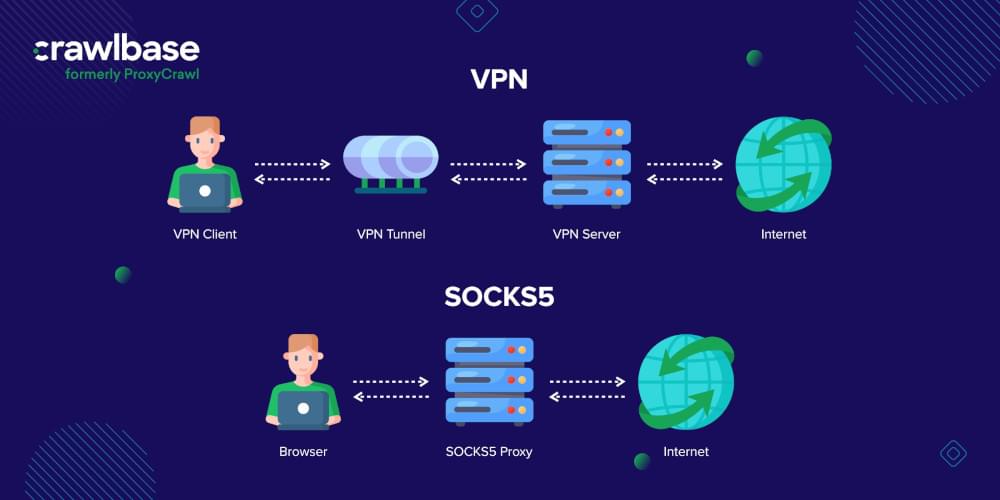In the digital age, the need to test websites and mobile applications across various geographical locations has become a common challenge for businesses and developers. Ensuring that your newly launched product functions smoothly and efficiently in different locales is essential for its success. However, this task can be daunting, especially if access to certain regions is restricted. This is where tools like VPNs and SOCKS 5 proxies come into play.
What Is a VPN?
A Virtual Private Network, or VPN, is a versatile internet application or software that provides users with a secure connection to remote locations over the internet. VPNs are primarily known for their ability to grant access to restricted websites, including the elusive dark web. They achieve this by establishing an encrypted virtual tunnel through which data packets travel across the internet. This encryption ensures that users can browse freely without compromising their online security or privacy. Vclub
Business enterprises often leverage VPNs for various purposes. For example, a mobile app developer may deploy VPN software to virtually place their browsing activity in a different country or state from their actual location. This allows them to gain a firsthand experience of how their new app functions in geo-targeted areas.
What Is a SOCKS 5 Proxy?
A SOCKS 5 proxy server, or simply a SOCKS 5 proxy, operates in a similar fashion to VPNs. These services reroute web traffic via HTTP proxy servers, offering users an alternative method for accessing restricted content.
The term “SOCKS” stands for Secure Socket, which underscores the original intention behind SOCKS 5 proxy extensions – security. Just like VPNs, there are several places where you can purchase SOCKS 5 proxies. Vclubshop, for instance, has established itself as one of the top SOCKS 5 proxy vendors, providing cutting-edge SOCKS extensions capable of rerouting web traffic across multiple channels simultaneously.
Differences Between a VPN and a SOCKS 5 Proxy
While VPNs and SOCKS 5 proxies may seem similar in function, they have distinct differences that can significantly impact their suitability for various tasks. Here, we explore these differences:
Speed
One of the primary distinctions between a VPN and a SOCKS 5 proxy is speed. SOCKS 5 proxies are generally faster than VPNs, offering users the ability to navigate from one website to another with minimal lag. If website load speed is a critical consideration, especially for online entrepreneurs, SOCKS 5 proxies often prove to be the better choice. They outperform VPNs not only in terms of upload and download speeds but also in responsiveness, commonly known as ping time.
It’s important to note that SOCKS 5 proxies are even faster than traditional proxies like HTTPs, making them a preferred option for tasks that demand speed.
Safety
While SOCKS 5 proxies excel in speed, they may compromise safety compared to VPNs. VPNs take more time to achieve optimal data encryption, which can explain their potential for slower load times. However, this delay is offset by the significant advantage of enhanced online safety and privacy. VPNs encrypt the virtual pathways through which data packets travel, offering a higher level of protection.
The only potential drawback of VPNs in terms of online safety is that some services engage in logging, which involves recording users’ activities, including browsing and downloading history. Depending on the nature of your online activity, this logged data could be used against you.
Efficiency
Efficiency varies between VPNs and SOCKS 5 proxies. A VPN connection masks your local IP address while encrypting all internet traffic to and from your device. This provides an additional layer of privacy, as incoming traffic will usually appear to originate from a different region.
On the other hand, SOCKS 5 proxies are application-specific. This means that the proxy only works for the specific application you are currently using it with. To improve the efficiency of SOCKS 5 proxies, it’s essential to activate the service on all relevant software and applications.
Number of IPs Provided
Another significant difference lies in the number of internet protocols (IPs) supported by VPNs and SOCKS 5 proxies. VPNs typically offer a single IP address. While this single IP address is secure, it may pose challenges if you need to change it or if you require multiple IP addresses for tasks such as web scraping or creating several social media profiles. Additionally, relying on a single IP address increases the risk of it getting banned from specific websites.
In contrast, many SOCKS 5 proxy providers offer multiple IP addresses. Although SOCKS 5 proxies are application-specific, having access to a range of IP addresses reduces the likelihood of encountering restrictions on specific websites.
Choosing Between VPN and SOCKS 5 Proxy
When deciding between a VPN and a SOCKS 5 proxy, it’s essential to consider your specific needs and preferences. If speed is of the utmost importance, particularly for tasks like web scraping or accessing region-restricted content, a SOCKS 5 proxy may be the better choice. On the other hand, if you prioritize online safety and privacy, a VPN might be the preferred option despite potential speed limitations.
Ultimately, the decision comes down to your individual requirements and the tasks you intend to perform using these tools.
Conclusion
In conclusion, VPNs and SOCKS 5 proxies are valuable tools for those seeking to browse anonymously and access geo-restricted content. However, they differ significantly in terms of browsing speed and online privacy. The choice between a VPN and a SOCKS 5 proxy ultimately depends on your unique needs and priorities.





























